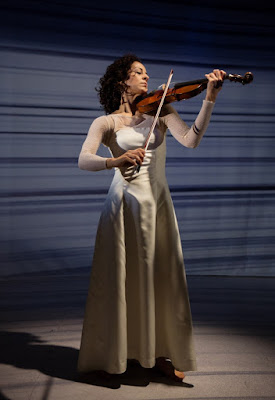Reviewed by James
Karas
A young scientist meets a young woman at a party. She is in the kitchen
crying and they strike up a conversation. She is distraught because she broke
up with her fiancé two days ago. In one of the fastest hops into bed, she
promises him 15 minutes of sex and 45 minutes of crying and they go for it.
In Hannah Moscovitch’s play Infinity, now playing at the
Tarragon Theatre, there is a lot more than merely man-meets woman because the
two people have concerns about time that go far beyond the chronological
parameters of coitus and bawling.
Amy Rutherford and Paul Braunstein. Photo: Cylla von Tiedemann
The play has a fourth character, a violinist (Andrea Tyniec) who appears
a number times on stage or behind a translucent
backdrop and plays music by Njo Kong Kie.
Part of the play is a domestic drama. Carmen becomes pregnant, the
couple argue, fight and separate. Sarah Jean in a series of monologues tells
some funny and harrowing stories in very salty language about affairs with
professors and other men. We see her as an eight-year old throwing a temper
tantrum and arguing vociferously. Endicott-Douglas gives a superb performance
in this fine role.
Elliot is consumed by his work and his theories about time and he
neglects his wife. There are the inevitable arguments and separation.
Andrea Tyniec. Photo: Cylla von Tiedemann
That is only a part of the story. Moskovitch wants to examine a loftier
theme and the question of time. Is time just an illusion? Does it exist at all?
Is it something like a story from the Bible that we were taught and simply
believe in it? Mr. Einstein?
Moscovitch does not take the issue lightly. She retained Lee Smolin, a
theoretical physicist (Yale, Penn State, Princeton and now The Perimeter
Institute for Theoretical Physics at the University of Waterloo) as a
consultant so we can be sure that what is said about time is mind-blowing if
not entirely comprehensible to mere mortals.
Braunstein gives a nuanced performance as the brilliant scientist who is
also very much human. Rutherford’s Carmen is more a dissatisfied wife than a brilliant
musician. Is the violinist her alter ego on stage? The music no doubt keeps emphasizing the theme of time and
structurally takes the play well beyond any idea that it is a domestic drama
but I am not sure about its relationship to Carmen.
Vivien Endicott-Douglas. Photo Cylla von Tiedemann
The set by Teresa Przybylski consists of a white background with
horizontal lines that covers the entire stage. Aside from that only a chair and
a table are needed. It is very effective.
Ross Manson does a splendid job of directing this co-production of
Volcano and Tarragon Theatre of a play that is both complex and approachable.
In the end we don’t learn if time is real or illusory. We are told the
fine distinction between the scientific idea of infinity and the religious
notion of the same that sees it as eternity. What catches up with Elliot is
mortality and if some of us want to consider it illusory or real we can enjoy
the real illusion that we have a choice between infinity and eternity.
______
Infinity by Hannah Moscovitch continues until January 29, 2017 at the Tarragon
Theatre Extraspace, 30 Bridgman Ave. Toronto, Ontario. www.tarragontheatre.com



No comments:
Post a Comment